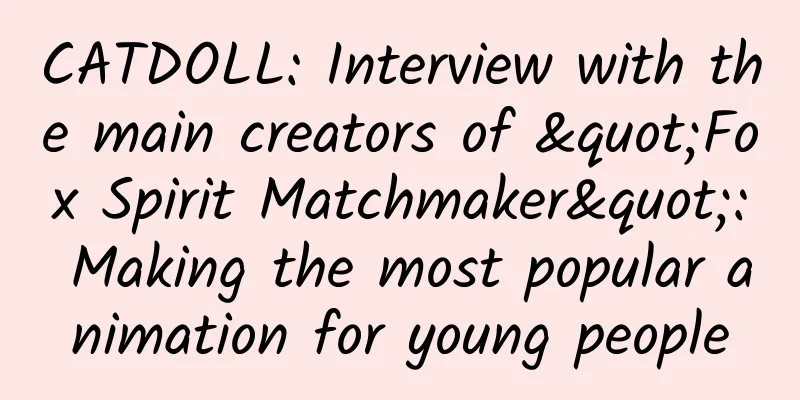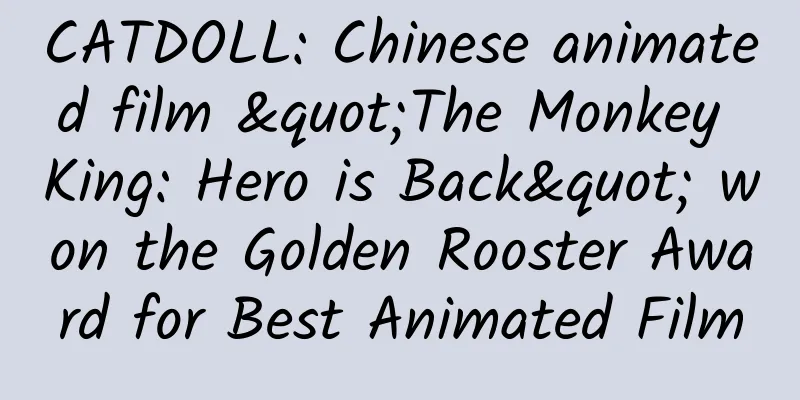CATDOLL: Interview with the main creators of "Fox Spirit Matchmaker": Making the most popular animation for young people

|
The animation of Fox Spirit Matchmaker has been launched recently. As a popular animation IP in China, Fox Spirit Matchmaker has attracted wide attention since its launch. At the animation press conference, the main creators also expressed their opinions. Interview with the main creators at the Fox Spirit Matchmaker press conference: Host: Hello, everyone from the media! This afternoon, the exchange meeting with the main creators of the animation "Fox Spirit Matchmaker" will begin soon. Let me introduce a few people. First, Mr. Liu Xinglun, the marketing director of Tencent Animation, Mr. Luo Hao, the director of the copyright center of Tencent Animation, Ms. Li Xiaoting, the director of the content center of Tencent Animation, Mr. Xiaoxin, the original author of the comic "Fox Spirit Matchmaker", Mr. Yao from Xia Tiandao, Mr. Zhang Jie, the animation dubbing teacher, and Wang Xin, the director of the animation "Fox Spirit Matchmaker". There are many guests. We all know that the origin of comics is comics. Let’s let teachers Xiaoxin and Yao start first. If you have any questions, you can ask teachers Xiaoxin and Yao. Q: Mr. Xiaoxin, it took you a long time to make this comic. Can you tell us specifically how long it took from the beginning of your creation to the basic formation of the comic? Xiaoxin: The idea for this comic was first proposed at a discussion meeting in 2010. At the time, I was working on other things, and it was a story that I was thinking about. Later, I felt that my thinking was more mature, so I started to work on it directly in 2012. It started serialization in a comic magazine in May 2012, and it continued until August and September 2013 when the magazine had problems. Later, at the end of October, the serialization was transferred to Tencent Comics, and it has been going on since then. After Tencent serialized it, it was serialized in the form of two articles per week. So the whole process of drawing it to the present is still quite long. Q: Were you alone throughout the whole process? Shin-chan: I have an assistant who is responsible for colors, and I am responsible for things other than colors. Q: Now more and more works have animations. Will the original plot of the comics be restored 100%? Or will there be some deletions? Does the original comic still have a say in this part? Teacher Yao: Animation is a brand new creation, because our comics will also be adapted into novels. I think the purpose of adaptation is to create a good work, not to be faithful to the original. Wang Xin: Each work is different. For "Fox Spirit Matchmaker", I should be faithful to the original work, because the relationship between the beginning and the end is very tight, and I can't change it. So in restoring the main line, I can only grasp the details and make the highlights, but the main axis will definitely not change. Host: After the questions on animation and comics, I will now leave the questions to the three leaders of Tencent Animation who are mainly involved in animation production. If you have any questions, you can ask the leaders of Tencent Animation. Question: Could you please tell the three leaders of Tencent what is the approximate level of investment in this animation? Li Xiaoting: This is not a very convenient question to answer. I can only say that this is the animation in which we have invested the most resources and funds so far, and we have high expectations for it. Q: Director Wang just said in the film that Chinese animation is now more eager for success. When I talked to my classmates, I also said that Chinese animation talents are relatively scarce. The demand exists. Maybe the investment bosses prefer to make quick money in the business model, so they offer some discounts, resulting in not many viewers, and this is a vicious cycle. What changes do you think a network platform can bring to the business model of Chinese animation? Luo Hao: First of all, Tencent is engaged in animation, and we have emphasized on different occasions that Tencent is not trying to make quick money, but is more about using the Internet to help animation, especially Chinese animation, to have a better ecological environment, so that more practitioners, animation directors, and downstream derivatives and even games can form a very good virtuous cycle. We also hope to establish a better and faster user feedback and communication channel through this Internet platform and Internet method, so as to bring together this group of fans centered on animation and comics and provide them with better services. We can help practitioners find a better business model and make this business cycle healthy. This is the goal that we at Tencent Animation have always hoped to achieve by investing in this field and participating in the animation industry. Therefore, Tencent will not do things that make quick money or seek quick success. Q: So for the work "Fox Spirit Matchmaker", there is no special expectation for its revenue? Luo Hao: Frankly speaking, we have not set a specific revenue target for comics and animation. But as I mentioned earlier, we hope to invest a lot of resources and energy through the Internet to find the most reasonable business model. In the end, we hope that these investments, including the efforts of authors and animation directors, will be rewarded. So we will not set specific goals, but we will work towards this direction. Q: Why did you choose an animation about a human-demon love story? How did you choose it? In addition, the target audience of animation is limited. After all, if it is broadcast on a platform like Tencent, what kind of audience do you think it will be targeted at in the end? Did you have such a prediction before? I think it may be different from the audience of comics. In addition, we may issue a press release and hope to give a specific broadcast time and the final schedule. Can you tell us about it? Liu Xinglun: In the past, when people talked about animation, they would think of cartoons and comics for children. Tencent Animation mainly produces animation for young people, including junior high school, high school, and college students. This is consistent with Tencent's own user and channel resources. This group of users has a strong desire for animation, and we hope to produce more animation for young people to meet the needs of this group of users. The first Chinese comic about human-demon love that you mentioned is related to the work brought by Xiaoxin, because it is a love story between humans and demons that spans time and centuries. We can also absorb the essence of the work, and hope that more works of this kind will meet you. Tencent Animation is a platform. We select animation works based on the judgment of users and professional teams. We will not limit ourselves to only one type of animation works. It still depends on the preferences of users and the level of professionalism. Some of our previous works, such as animation and Mr. Marvelous China, lack a pure love story like Fox Spirit Matchmaker. So it is also a good theme for the enrichment of our works. Q: I know that Tencent proposed the concept of pan-entertainment a long time ago. We can see that Fox Spirit Matchmaker is a very good work. Will Tencent explore its value in other fields around this IP? Luo Hao: Tencent has proposed the concept of pan-entertainment for a long time. Tencent Animation was also established under the overall strategy of such scope and concept. It may have been a small business team at the beginning, but now we have established an independent business unit. All these actions and resource layouts are carried out around the overall strategy. Therefore, based on the specific IP of "Fox Spirit Matchmaker", we will still build possible future online dramas, live-action dramas, big movies, games, and even other forms of publications, as well as some derivatives, etc. around this strategy. If possible, we are willing to make some attempts, including with very excellent games or applications on the Tencent platform, such as QQ Mobile, WeChat, etc., and we will try to make these efforts. Many times we have done our best, but whether it is accepted by the market or recognized by users is up to the users to choose. We use channels such as the Internet to quickly meet, debug, and test user needs, and ultimately create a favorite, truly favorite pan-entertainment IP or IP matrix system. We will do our best, make our best efforts, and invest the most resources to make this project or IP the best. Moderator: The next question is for Director Wang. As you have all seen, the quality of our cartoon has probably exceeded your imagination of previous domestic cartoons. Director Wang's team is very international. Before answering this question, please let Director Wang introduce the team. Wang Xin: Our team is Huimeng Culture Studio, which is a relatively large company with four production companies in China. We are the main company. We have a branch in Japan and a branch in South Korea. This is the layout. Host: Are there any foreign members in this production team? Wang Xin: There are many foreigners and Chinese working abroad. Everyone thinks that many Japanese and Korean cartoons are made by Japan or South Korea, but it is not true. A large number of young Chinese went to Japan to study animation from 2000 to 2004, and they are now very mature. They had a hard time in Japan before. When we had the opportunity to work with them, I remember having a party with them in Japan two months ago, everyone said that we could return to China, saying that Chinese animation was like this, and they would help us work in our Japanese and Korean companies and come back after a while. Q: You just mentioned that there are some changes in the competition for animation talents in Japan and South Korea, including changes in mentality and the overall creative environment. I would like to talk about your personal experience. In particular, the Internet has paid more attention to the animation industry and has penetrated this industry in recent years. From the perspective of talent, have people actually experienced any significant changes in their mentality towards Chinese animation and the environment? Wang Xin: It was subversive. Since I entered the industry, I have experienced two earth-shaking changes. The first earth-shaking change was when I was doing "I Love Singing" (transliteration 17:30 seconds). That was a peak, but that peak caused all the talents to fall. That was the peak, and then both comics and animation almost reached a trough in 2000, all died, and almost nothing was left for the next generation. The second time was the rise of television platforms, including the rise of Hunan Satellite TV. At that time, a strange phenomenon occurred that the state supported a group of people who were not considered talents but also talents, but they laid the foundation for our group of talents. Q: When is the time node? Wang Xin: The time node is around 2004 to 2010 and 2012. These two platforms are because there are no good works that can directly face the audience. They always face the audience through platforms or policies. This is very unfair, so many good talents go abroad or continue to write in their own way. But the Internet can put the works online, that is, the audience can scold me or say good things about me. This is subversive to our industry. This subversion has caused all talents to find their own sense of accomplishment and space to publish works on the Internet. That's why there are so many funds, themes and talents willing to return to the Chinese animation industry this time. So many people abroad also want to come back. Q: Are people in this industry relatively loose? Do they have a gathering place? The entrepreneurial industry always relies on upstream talents. What do you think of the current status, talent, and atmosphere? How long will it take for the talents in this industry to become more stable? Wang Xin: This is a relatively large scope. We cannot decide. All talents will be classified and dispersed. But how to gather these talents to serve a platform or an industry is ultimately the responsibility of the industry association. However, the industry association needs people to take the lead and organize. We producers are only a part of it. We can do what we should do, and then influence the entire industry to establish the industry association. Someone will be responsible for us producers, and we will also be responsible for the animation industry. Q: We have seen that some vertical platforms have started to do this a long time ago. Tencent is dependent on the entire ecosystem, including our own early Internet genes. In terms of IP operation, what advantages do you have compared to vertical platforms? Or are there any differences in the operating model? Li Xiaoting: The question just now mainly focused on the scarcity of entrepreneurial talents. How can we solve this problem in the future? First of all, in the animation industry, we believe that the entrepreneurial art industry is very dependent on upstream talents. We can see that with the development of the entertainment industry in the past two years, and the entry of the Internet into the animation industry, and Tencent holding high the banner of pan-entertainment and the animation industry under pan-entertainment, we also have corresponding strategies. For example, the cartoonist incentive strategy, including the support for original animation studios. These are all in our future development strategy. But I still believe that the development of the entire industry still needs more talents to work together, as well as some joint efforts of industry peers. So we believe that the future is still relatively optimistic. Host: Regarding animation, this art form has very high requirements for dubbing. When we were young, we knew that Li Yang dubbed Donald Duck, etc. In the film and television industry, everyone wants to watch the original foreign language when watching dubbed films. I feel that in recent years, domestic film and television, including three-dimensional games and animation, have improved. You can communicate with Mr. Zhang Jie about his dubbing. Question: The host just said that voice actors are very popular in Japan. Do you think there will be a follow-up industrial chain in China like in Japan? Zhang Jie: At present, I always feel that the current stage of dubbing development in China is a bit like that of Japan in the 1970s and 1980s. Maybe the 1970s is more accurate. It was also some teachers, especially some professional groups such as the People's Art Theater, and some teacher actors who guest-starred in dubbing. But now with the development, there are many professional dubbing actors who specialize in dubbing. I think as Chinese animation develops, the number of animations will increase, and more voice actors will focus on animation. Because now we are dubbing more three-dimensional TV series and movies. There is no way that there are so many animations, and the annual output is only so small, so if everyone wants to survive, they can only rely on dubbing some three-dimensional things. Now animation has a good development momentum, and I believe that the core projects of the dubbing industry will gradually develop. Q: Regarding your dubbing of the three-dimensional world, what is the difference now that you are switching from the three-dimensional world to the two-dimensional world? Zhang Jie: I first started to like dubbing when I was very young and watched a lot of animation. People of my generation watched a lot of imported Japanese animation. Nowadays, it is rare to see imported Japanese animation, but there are still some. But I watched a lot of it back then, and since then I have liked dubbing animation. So it is not accurate to say that I switched from the three-dimensional world. Q: I have always been a fan of Japanese anime. Dubbing is very important for animation. If the animation itself is excellent, but the dubbing is not good, I will not watch this movie. At present, our domestic voice actors are mainly concentrated in TV and movies. What do you think are the differences in the requirements for dubbing for TV series, movies and animation? Zhang Jie: This question was also mentioned at the premiere, which is the difference between dubbing for real people and animation. Real people are second performances, and someone has already performed before, so we just follow his performance. However, dubbing for two-dimensional animation does not involve performance, but just drawings. It is possible that it will move after being made into an animation, but most of the dubbing we do not move, so we can only rely on our own imagination and discuss with the animation author, comics author and director. If I were an animation director, I would understand the characters, design voices for each character, and tell them what the character should feel like. If I were dubbing a real person, it would be very simple. I would make sure to reproduce his performance the same way he does, so that when people watch it, it feels like it's not dubbing, but the actor himself speaking. But animation is definitely dubbed. Host: We also held a premiere for Fox Spirit Matchmaker this time. Its marketing promotion is the biggest one among all Tencent works. Please let our marketing director Mr. Liu Xinglun introduce why we spend so much money to promote this work and what measures we have taken? Liu Xinglun: Because I just asked about the investment of this animation, I can't tell you. You can feel it. Chinese animation has never been promoted at this level before. What you see today is just the beginning. There will be more activities in the future. This time we are also promoting it with a complete super IP work. In the past, people read comics as comics and watched animations as animations. The mechanism is mainly centered around the works. As you can see today, in addition to cartoonists, animation directors, music performances by Mo Mingqimiao and voice performances by Zhang Jie, the animation industry chain is a very long and extensible field, which can extend a lot of content. I hope that these contents will allow more users to participate. In this way, the entire Chinese animation industry will develop in a healthier and more mature direction. Teacher Zhang Jie just said that there were few animation works that could be dubbed before, and Shin-chan had a hard time because the industry chain was not perfect. Now if we can give it a push from behind, and make animation more and more mature, so that everyone can live better and get more returns in this industry chain, then more and more talents will invest in this industry chain, and more and more users will pay attention to it, and finally form a virtuous circle, and finally produce a Chinese two-dimensional Chinese animation. We hope that Tencent can become the carrier of China's own two-dimensional animation, and everyone can play it themselves. This is why we spend so much energy to promote this work, and we hope there will be more such works in the future. Moderator: Maybe many people don’t know enough about it, and it needs more interaction with the outside world. Last question. Q: When we first started the ACG industry, everyone was mainly based on Japanese comics, so for a long time, our Chinese comics encountered many difficulties in their rise. So far, what do you think our Chinese comics have developed to? What kind of environment makes us feel that there is a clear difference between them and Japanese and Korean comics? Or what stage have we reached that makes everyone feel that Chinese comics have changed significantly over the years? Where is this obvious change? I hope Director Wang can answer this question. Wang Xin: We all think that Chinese animation has come a long way, but in fact it has not. When Chinese animation was building its shed, its backbone was already broken. It was after the 1980s, and even before the 1990s, Chinese animation had a big gap. Speaking of style, Japan followed the United States for 40 years before it developed its own style. They stood on the shoulders of giants. In the 1980s and 1990s, they produced "Saint Seiya", and it took another 10 years to achieve the current results. In China, we are learning everything we do. Don't say anything. We are creating and learning. Our generation is used to learn. We have learned things and passed them on to the next generation for them to create. So I can't say anything with the current ideas of our generation. Question: Since this animation is a web animation, it definitely involves the issue of updates. I would like to ask the director what the update cycle of this film is? Wang Xin: We update every two weeks now. We hope that it will be faster in the future, but to be honest, with this quality, updating every two weeks is a relatively stable speed. Everyone hopes that it will be updated weekly, and I hope so too. Host: Thank you all media teachers, today’s interview ends here! |
<<: CATDOLL: June 22 is the day when the apostles will attack. Brave young men are ready!
>>: CATDOLL: "Young Leaf Girl" releases new promotional video, OP song sung by Ray
Recommend
CATDOLL: "Love Live!" Minami Kotori male version COS costume appeared in Akihabara and was actually worn by a cult member
Never doubt the fighting power of otakus, especia...
CATDOLL: The content of the manga "Naruto Gaiden - The Seventh Hokage's Scarlet Moon" was revealed. Sakura is going to be a mother?!
The Naruto spin-off manga "Naruto Gaiden - T...
CATDOLL: A real man with green algae hair. Zoro's classic battle in One Piece has attracted heated discussions among netizens
As the second male lead in One Piece, Zoro is a h...
CATDOLL: The movie "Dragon Nest: Throne of Elves" will be released in the summer of 2016
The animated film "Dragon Nest: Dawn of War&...
CATDOLL: "Food Wars! Soma" manga 195 information: The Golden Age of Polaris Dormitory
The information of the 195th chapter of the manga...
CATDOLL: New information about One Piece manga 789: That man appears?
Recently, a rare Japanese weekly Jump published a...
CATDOLL: Hayashi Naoko x Okiura original project "Plastic Memories" started
Naoko Hayashi, the author of well-known science f...
CATDOLL: January new show "The Weakest Undefeated Divine Dragon" character design released, broadcast on January 11
The TV animation "The Weakest Unbeatable God...
CATDOLL: The censored scenes of Gintama broadcast on Japanese TV are comparable to Minecraft
Under the strict control of Japan's rating sy...
CATDOLL: Anime Starry Sky Evening News: The super scary lolita in the animation "The Saga of Little Girls" will appear in the movie "Killing Organ" to be released in February 2017
Good evening, everyone. It's time to review a...
CATDOLL: Is Makoto Shinkai the genius in the history of Japanese animation, surpassing Master Hayao Miyazaki?
The movie version and the Chinese novel version o...
CATDOLL: Naruto Gaiden Episode 8 Naruto's mouth-to-mouth dialogue brings back memories
The 8th chapter of the Naruto manga was released ...
CATDOLL: July new show "ReLIFE" PV released, let's go back to high school
The manga "ReLIFE" created by Japanese ...
CATDOLL: Japanese netizens are discussing the proliferation of idol voice actors. Is it difficult to make a name for yourself without going into the adult entertainment industry?
For a long time, voice actors and idols were two ...
CATDOLL: The memorable scene in "Detective Conan" where Kogoro can never be shot dead
A list of the most impressive scenes in "Det...









